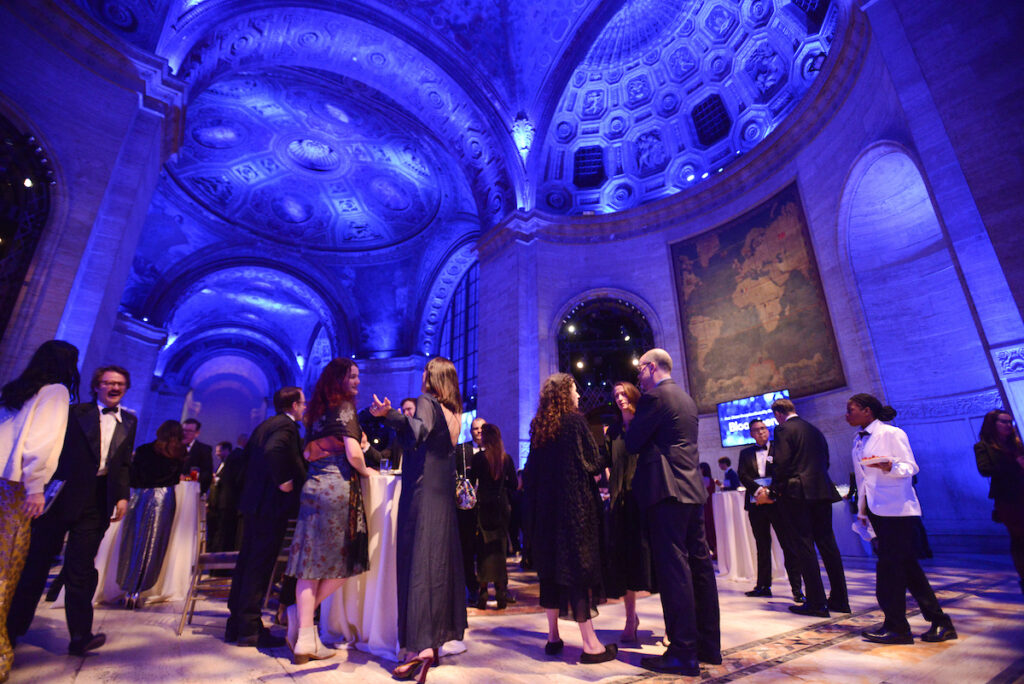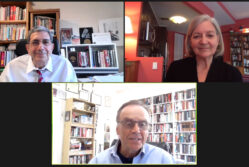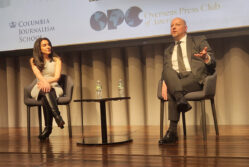Archive Event Highlight

Overseas Press Club Annual Awards Dinner Honors Journalists Around the World and Spotlights Coverage of Russia’s Invasion of Ukraine
by Rebecca Redelmeier
International correspondents gathered in New York City for the Overseas Press Club of America’s 84th annual awards dinner on April 27 to celebrate and honor brave journalists whose reporting brought to light stories of conflict, controversy, and resilience from around the world this past year.
Thousands of miles away from the war in Ukraine, many recognized the toll the conflict has wrought on both international and local journalists who have risked their lives to bring the world coverage of Russia’s ongoing invasion.
“The brutality faced by the Ukrainian population, the repression of human rights and information, the geopolitical factions emerging from the conflict rightly loom large over tonight’s prizes,” said keynote speaker Alessandra Galloni, editor-in-chief for Reuters and a past OPC Award winner. “Journalists are putting their lives, their health, their freedom at risk to gather facts on the ground in order to inform the world.”
To read a transcript of Galloni’s remarks, click here.
Explore a page with photos and videos from the event here.
OPC President Scott Kraft presented CNN Chief International Correspondent Christiane Amanpour with this year’s President’s Award, recognizing her as one of the world’s leading war correspondents.
“It matters that we get up from the free and democratic world and take our mission and passion around,” said Amanpour, who is also a past OPC award winner. “To walk the walk, to talk the talk, and to tell the stories that everybody needs to see.”
Oksana Markarova, the ambassador of Ukraine to the United States, lit a candle to honor the journalists who have been killed, imprisoned or missing while doing their jobs. Journalists around the world have faced threats, harassment, and danger this year for their reporting. Those risks have been particularly stark for journalists covering the war in Ukraine.
“Access to information and journalism is the first basic need that all human beings who believe in democracy have,” Markarova said. “Right now, this tragedy of course is not just for all Ukrainians who are fighting or civilians who have been killed, but journalists [too].”
Click here to make a donation to the to support the OPC’s fund for journalists in Ukraine..
Throughout the night, several speakers called for the immediate release of Wall Street Journal reporter Evan Gershkovich, who Russia detained in March and has been imprisoned for over four weeks.
Almar Latour, the chief executive officer of Dow Jones and publisher of The Wall Street Journal, said teams have been working around the clock to secure his release. He delivered a message from Gershkovich, through his lawyers, saying the journalist was “humbled and deeply touched by all the letters I received. I’ve read each one carefully with gratitude.”
Seven of this year’s 22 awards related to coverage of the war in Ukraine, honoring journalists who bore witness to atrocities and investigated violence to report stories that would have otherwise gone untold.
The prestigious Hal Boyle Award for best newspaper, news service or digital reporting from abroad was awarded to a team from The Associated Press that included Mstyslav Chernov, Evgeniy Maloletka, Vasilisa Stepanenko, Lori Hinnant and staff. Their courageous coverage highlighted the siege of the Ukrainian city of Mariupol, work that judges called “a model of what war reporting should aim to achieve.”
“For twenty days in Mariupol, we were witnesses of war crimes — atrocities committed by the Russian government,” said Maloletka in a recorded video acceptance speech. “For us, it was really important to show to the country and to the world what’s happening to Ukrainians.”
As the war has continued, journalists have persisted in covering the brutality of the conflict to bring audiences across mediums stories that highlighted the scale of the violence and the resilience of the Ukrainian people.
Marcus Yam of the Los Angeles Times won this year’s Robert Capa Gold Medal Award for best photographic reporting from abroad for his series of photographs covering the first 30 days of war in Ukraine.
“When I flew into Kharkiv last year, I — like everyone else — hoped that the escalating tensions between Russia and Ukraine would be resolved through diplomacy,” Yam said in his acceptance speech. “A year later, the war seems to be endless. I only hope that our work sheds dignity on the suffering that so many have endured.”
The David Kaplan Award for best TV or video spot news reporting from abroad was presented to the team at CNN Worldwide.
“The CNN team of numerous correspondents, producers, photographers, and translators took us live into the depths of the horrors unleashed by Russia’s army, from the moment the first shots were fired, giving us frontline seats as we watched the tanks roll and artillery rounds land, tearing villages and families apart,” the judges said.
CNN Senior International Correspondent Matthew Chance accepted the award on behalf of the team.
“The war, as they still refuse to call it here, has challenged our understanding of the world from the outset,” Chance said in his speech, recorded in Moscow. “Cities destroyed, the horrors, millions of lives disrupted, and of course, countless lost — we didn’t anticipate any of that. And we still don’t know how it is all going to end.”
Other awards recognized gripping stories that shaped the past year, including coverage of post-war Afghanistan, investigations into corporate hypocrisy, and stories from Haiti on the country’s surge in migration and the 2021 assassination of President Jovenel Moise.
Ramita Navai, Karim Shah and Eamonn Matthews from Frontline PBS received the David A. Andelman and Pamela Title award for best international TV, video, radio, audio or podcast reporting showing a concern for the human condition. Their documentary “Afghanistan Undercover” explored the ongoing crisis women face in Afghanistan.
“It’s an opportunity to keep talking about the situation for women in Afghanistan, which our investigation found to be far worse than we all imagined, and which as we know is only getting worse,” said Navai in her acceptance speech. She ended with a message from an Afghan activist asking the crowd to not forget the women of Afghanistan.
Throughout the evening, award winners and speakers highlighted the role of partner organizations, producers, fixers, and journalists based overseas play in bringing international reporting to light, and who often face grave risk while doing so.
The Bob Considine Award for best newspaper, news service or digital interpretation of international affairs went to Nicolas Pelham of the Economist for “MBS: Despot in the Desert,” published in 1843 magazine. His story examined the contradictions and influence of Saudi Crown Prince Mohammed bin Salman.
“It’s a story that should have been told by Saudis themselves, but they’re not able to do it,” Pelham said. “I think that’s really the role of the international correspondent — to speak out in their name.”




